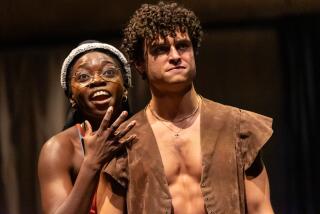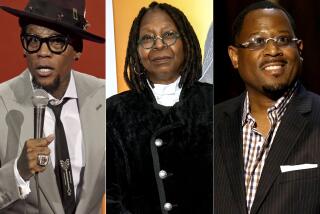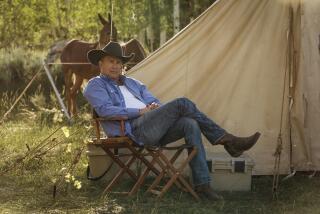PBS’ ‘Masterpiece’ Gives Top Billing to the Mobil Corp.
- Share via
“Philco TV Playhouse” and “Texaco Star Theater” on NBC. “General Electric Theater” and “Philip Morris Playhouse” on CBS. “Hallmark Hall of Fame,” almost as old as television itself, which has been broadcast on NBC, ABC and CBS.
There is history in the use of brand names in TV program titles. But never before on commercial-free PBS. At least not until now.
On Feb. 4, the venerable “Masterpiece Theatre”--home to such acclaimed TV productions as “The First Churchills,” “I, Claudius,” “Upstairs, Downstairs,” “The Jewel in the Crown” and this year’s “The Politician’s Wife,” the series that has aired dramas based on Charles Dickens, Henry James and Jane Austen--will become “Mobil Masterpiece Theatre.”
On the eve of “Masterpiece Theatre’s” 25th anniversary earlier this month, Henry Becton, president of WGBH-TV in Boston, the station that packages the British productions for presentation in the United States, said the title was being changed “to recognize Mobil’s ongoing support to the program and to public television. Mobil’s commitment is longer and at a level unparalleled in public television history.”
“It’s PBS’ way of acknowledging the sole underwriter,” said “Masterpiece Theatre” executive producer Rebecca Eaton. “They are the longest continuous sole underwriter” among public TV supporters.
But some public television observers question whether “Masterpiece Theatre,” a jewel in the crown of the noncommercial system with four Peabody Awards and 26 Emmys--or public broadcasting itself--will be tarnished by having the oil company’s name out front. There is also the question of whether this will open the door to other such changes: “General Motors’ Civil War,” perhaps, or “Southern California Edison’s Puzzle Place”?
*
Ken Burns, PBS’ renowned filmmaker of “The Civil War” and “Baseball,” called the name change “a step in the wrong direction.”
“Public television’s future lies in distinguishing itself from the rest of the pack--not trying, chameleon-like, to become like everything else,” he said from his home in Walpole, N.H. “The best news, the best history, the best children’s, the best arts programming still is on public television. All we need to do is make our case. We don’t need to put up a billboard.
“I just know there are struggles within public television about its [funding] future,” Burns added. “And I am very much of the conservative school that feels that we need to hang onto and protect the kind of identity we have. Otherwise we begin to blur the pristine distinction between us and A&E; and Discovery and other entities.”
Richard Leone, president of the Twentieth Century Fund, a nonprofit group that has issued major reports on public television, called the name change “a slippery slope. . . . Public television ought to be public. It ought to be supported out of contributions and by the government.”
Michael Jacobson, executive director of the Center for the Study of Commercialism in Washington, asserted that “Mobil Masterpiece Theatre” is “yet another example how corporations seem to be getting their names or their products everywhere.”
PBS’ tribute to Mobil--providing such visibility with its name forever linked to “Masterpiece Theatre,” down to the fine type of TV listings--comes eight months after the oil company announced that it would stop funding “Mystery!” after the current season. It had been sole funder for 15 seasons; now PBS is supporting a portion of the series.
Mobil, at the same time, announced that it would fund “Masterpiece Theatre” through 1999.
None of the principals would disclose whether overall funding to “Masterpiece” would increase with the withdrawal of “Mystery!” money. “We’re not obliged to discuss the level of spending for the balance of the contract with WGBH,” Mobil spokeswoman Nancy Carlson said.
Nor will WGBH or Mobil say how much the corporation has contributed to public television, although the figure is estimated to be in the multiple millions of dollars.
But Peter Downey, PBS’ senior vice president for program business affairs, who played a key role in approving the name change, noted that with 25 years of funding to “Masterpiece Theatre,” supporting “Mystery!” and other public-TV productions, it’s “evident on its face” that Mobil is “light-years ahead of every other funder we’ve had.”
The idea for the name change was generated at WGBH and approved by PBS. All parties insist that Mobil had nothing to do with the decision.
*
Downey said that Becton presented the idea several months ago to PBS President Ervin Duggan, who turned it over to Downey and others on his staff, asking two questions: “ ‘Can PBS do this?’ as a legal question, and ‘Should we do it?’ ”
After considerable study, Downey said, “we determined it was not in violation of FCC [Federal Communications Commission] rules. We satisfied ourselves there was no regulatory prohibitions.” On the second question, senior management decided to approve it because of the “extraordinary relationship with Mobil over the years.”
Asked whether this wouldn’t open the door to other program underwriters seeking to get their names into titles, Downey insisted that it would not. “The point we have made to the stations . . . is that this is such a unique case that frankly I can’t imagine us doing it again.”
More to Read
The complete guide to home viewing
Get Screen Gab for everything about the TV shows and streaming movies everyone’s talking about.
You may occasionally receive promotional content from the Los Angeles Times.






